- Home
- Carlos Ruiz Zafón
Marina Page 2
Marina Read online
Page 2
‘In other words, you’ve stolen it,’ he concluded.
‘That’s not the point,’ I objected.
‘I’d like to know what this Germán person thinks the point may be,’ JF replied.
‘This Germán person probably died years ago,’ I suggested without much conviction.
JF rubbed his chin.
‘I wonder what the penal code has in store for those juvenile miscreants inclined to the premeditated theft of personal objects and watches engraved with a dedication . . .’
‘There was no premeditation, or anything of the sort,’ I protested. ‘It all happened suddenly – I had no time to think. By the time I realised I had the watch, it was too late. You would have done the same in my place.’
‘In your place I would have had a heart attack,’ remarked JF, who was more a man of words than a man of action. ‘Supposing I’d been crazy enough to go into that old house following a feral cat with a bleeding bird in its jaws. God knows what germs you could catch from that kind of animal.’
For a while we just sat there without saying a word, listening to the faraway sound of the rain.
‘Well,’ JF concluded. ‘What’s done is done. You’re not thinking of returning to the scene of the crime, are you?’
I smiled meekly.
‘Not on my own.’
My friend’s eyes opened wide.
‘Don’t even think about it.’
That afternoon, once classes were over, JF and I slipped out through the kitchen door and headed for the mysterious street leading to the mansion. The cobblestones were spattered with puddles and dead leaves, and a threatening metallic sky hung over the city. JF, who wasn’t at all sold on the merits of our outing, looked paler than usual. The sight of that remote corner trapped in the past must have made his stomach shrink to the size of a marble. The silence was eerie.
‘I’ve seen enough. Let’s call it a day – let’s turn round and return to our boring but safe lives in the school,’ he mumbled, taking a few steps back.
‘Don’t be a chicken.’
‘I won’t even respond to that . . .’
Just then the tinkle of a bell drifted through the wind. JF went quiet. The cat’s yellow eyes were watching us. All of a sudden the cat hissed like a serpent and showed us its claws. The fur on its back stood on end and it opened its jaws to reveal the fangs that had taken the life of a sparrow a few days earlier. A distant flash of lightning illuminated the sky like a cauldron of light. JF and I exchanged glances.
Fifteen minutes later we were sitting on a bench next to the pond in the boarding-school cloister. The watch was still in my jacket pocket, feeling heavier than ever.
There it remained for the rest of that week, until the early hours of Saturday morning. Shortly before dawn I awoke with the vague feeling of having dreamed about the voice captured in that old gramophone. Outside my window Barcelona was coming alive in a canvas of scarlet shadows. I jumped out of bed and looked for the wretched watch that had been cursing my existence for the past few days. We stared at one another. Finally, arming myself with a determination one can only summon when having to face some ridiculous task, I decided to put an end to the matter: I was going to return it.
I dressed quietly and tiptoed along the dark fourth-floor corridor. Nobody would notice my absence until ten or eleven o’clock. By then I hoped to be back. Or else.
Outdoors, the streets still lay beneath that mantle of purplish brightness tingeing the dawn skies of Barcelona. I walked down to Calle Margenat. Sarriá was waking up around me as low clouds swept through the district, capturing the first light in a golden halo. Here and there the front of a house was just visible through gaps in the haze and the swirling dry leaves.
It didn’t take me long to find the street. I paused for a while to take in the silence and the strange peace that filled that lost corner of the city. I was beginning to feel that the world had stopped like the watch I had in my pocket when I heard a sound behind me.
I turned round and beheld a vision straight out of a dream.
CHAPTER 3
A BICYCLE WAS SLOWLY EMERGING OUT OF THE mist. A young girl clad in a vaporous white dress was pedalling up the hill towards me. In the early sunlight I could almost make out her silhouette through the cotton. Her long straw-coloured hair waved about, concealing her face. I stood there, immobile, watching her as she approached, rooted to the ground like a fool. The bicycle stopped a couple of metres away. My eyes, or my imagination, spied the shape of slim legs as she stepped down. Slowly, I took in every part of that dress – which looked like something out of a Sorolla painting – until my eyes rested on the girl’s deep grey eyes, so deep you could fall straight into them. They were riveted on mine with a sarcastic look. I gawped at her, smiling stupidly.
‘You must be the watch thief,’ said the girl in a tone that matched the strength of her expression.
I reckoned she must be about my age, perhaps a year or two older. Guessing a woman’s age was, for me, an art or a science, never a pastime. Her skin was as pale as her dress.
‘Do you live here?’ I stammered, pointing to the gate.
She didn’t even blink. Those eyes drilled into me with such intensity that it took me a long while to realise she was the most stunning creature I had ever seen, or hoped to see, in my entire life. Full stop.
‘And who are you to ask?’
‘I suppose I’m the watch thief,’ I improvised. ‘My name is Oscar. Oscar Drai. I’ve come to return it.’
Without waiting for a reply, I pulled the watch out of my pocket and handed it to her. She held my gaze for a few seconds before taking it. When she did, I noticed that her hand was strikingly pallid and that she wore a plain gold band on her ring finger.
‘It was already broken when I took it,’ I explained.
‘It’s been broken for fifteen years,’ she murmured without looking at me.
When at last she raised her eyes, she did so to examine me from head to toe, like someone sizing up an old piece of furniture or a bit of junk. Something in the way she looked at me made me realise she didn’t really believe I was a thief; she was probably categorising me as your run-of-the-mill imbecile. My beguiled expression surely didn’t help. The girl arched an eyebrow and smiled mysteriously as she handed the watch back to me.
‘You took it; you return it to its owner.’
‘But . . .’
‘It isn’t my watch,’ she explained. ‘It belongs to Germán.’
The mere mention of that name conjured up the image of the towering figure with white hair that had surprised me in the conservatory a few days earlier.
‘Germán?’
‘My father.’
‘And you are?’ I asked.
‘His daughter.’
‘I meant, what’s your name?’
‘I know exactly what you meant,’ replied the girl.
She climbed back onto her bike and rode through the entrance gate, looking back briefly before disappearing into the garden. Those eyes seemed to be ridiculing me with their laughter. I sighed and followed her. An old acquaintance welcomed me in: the cat, staring at me with its usual disdain. I wished I was a Dobermann.
The cat escorted me as I negotiated my way through the tangled garden. When I reached the fountain with the mermaid, the bicycle was leaning against it while its owner unloaded a bag from the basket fixed over the handlebars. There was a smell of freshly baked bread. The girl pulled a bottle of milk out of the bag and knelt down to fill a bowl that was lying on the ground. The animal rushed to its breakfast. It looked like a daily ritual.
‘I think he prefers to kill his food before he eats it,’ I said.
‘He only hunts for fun. He doesn’t eat what he catches,’ she explained as if she were talking to a child. ‘It’s a territorial thing.’
‘What an adorable little beast,’ I remarked.
‘What he likes is milk. Don’t you, Kafka? You love milk, don’t you?’
The Kafkae
sque cat licked her fingers in agreement. The girl smiled warmly and stroked his back. Through the folds of her dress, I could see the muscles flex on the side of her body. Just then she looked up and caught me watching her and licking my lips.
‘How about you? Have you had breakfast?’ she asked.
I shook my head.
‘Then you must be hungry. Dimwits are always hungry,’ she said. ‘Here, come in and have something to eat. It will do you good to have a full stomach if you’re going to tell Germán why you stole his watch.’
The kitchen was a large room at the back of the house. My condemned-man’s breakfast consisted of delicious buttery croissants the girl had bought at the Foix patisserie in Plaza Sarriá, along with a very large cup of white coffee. She sat down facing me while I avidly devoured my feast, eyeing me with a mixture of curiosity, pity and suspicion, as if she’d taken in a starving beggar. She herself didn’t eat a thing.
‘I’ve seen you around here before,’ she remarked without taking her eyes off me. ‘You and that little guy who looks like he’s just seen a ghost. You often cross over the street behind this one when they let you out of the boarding school. Sometimes it’s just you, humming in an absent-minded way. I bet you have a great time in that dungeon of a school . . .’
I was about to make some witty reply when an enormous shadow spread over the table like a cloud of ink. My host looked up and smiled. I sat there, stock-still, my mouth full of croissant, my heart beating like castanets.
‘We have a visitor,’ she announced gleefully. ‘Dad, this is Oscar Drai, an amateur watch thief. Oscar, this is Germán, my father.’
I gulped down my food and slowly turned my head. Standing above me was an impressively tall figure wearing an alpaca wool suit, with a waistcoat and a bow tie. The man’s white hair, neatly combed back, fell to his shoulders. His face, finely chiselled around dark sad eyes, displayed a grey moustache. But what really defined him were his hands. The white hands of an angel, with slender and unusually long fingers. Germán.
‘I’m not a thief, sir . . .’ I stated nervously. ‘Let me explain. I only ventured into your house because I thought it was uninhabited. Once I was inside, I don’t know what happened to me, I listened to that music, well, no, well, yes, the thing is, I came in and saw the watch. I wasn’t going to take it, I swear, but I got scared and by the time I realised I’d taken the watch, I was already quite a distance away. That is to say, I’m not sure whether I’ve explained this properly . . .’
The girl was smiling mischievously. Germán’s eyes rested on mine. They were unfathomable. I rummaged about in my pocket and handed him the watch, expecting that at any moment he’d start shouting and threatening to call the police, the Civil Guard and the Juvenile Court.
‘I believe you,’ he said amiably, taking the watch and sitting down next to us at the table.
His voice was gentle, almost inaudible. His daughter served him two croissants on a plate and a cup of coffee just like mine. As she did so she kissed her father on the forehead and he put his arm around her. I gazed at them against the light that strayed in through the windows. Germán’s face – which I’d expected to be the face of an ogre – became delicate, almost frail. He was extraordinarily thin. Smiling at me kindly, he brought the cup to his lips, and for a moment I noticed that the affection flowing between father and daughter went beyond words and gestures. A silent bond, a look in their eyes, seemed to draw them together in the shadows of that house at the end of a forgotten street, where they took care of one another, far from the world.
Germán finished his breakfast and thanked me for having taken the trouble to return his watch. So much kindness made me feel doubly guilty.
‘Well, Oscar,’ he said in a tired voice. ‘It’s been a pleasure to meet you. I hope to see you round here again, whenever you wish to pay us another visit.’
I couldn’t understand why he insisted on speaking to me so politely. There was something about him that made me think of another age, of other times when his grey hair shone and the old mansion was a palace halfway between Sarriá and heaven. He shook my hand and said goodbye to me before disappearing into what seemed like an impenetrable maze. I saw him walk away down the corridor, limping slightly. His daughter watched him, trying to conceal the sadness in her eyes.
‘Germán isn’t very well,’ she murmured. ‘He gets tired easily.’
But she quickly put on a cheerful expression.
‘Would you like anything else?’ she asked.
‘It’s getting late,’ I replied, struggling against the temptation to seize any excuse for prolonging my stay. ‘I think I’d better be going.’
She accepted my decision and came with me into the garden. The morning light had scattered the mist and the onset of autumn tinged the trees with copper. We walked towards the gates; Kafka purred in the sun. When we reached the exit the girl remained inside and opened the gate for me. We looked at one another without saying a word. She put out her hand and I shook it. I could feel her pulse beneath her velvety skin.
‘Thanks for everything,’ I said. ‘And I’m sorry about . . .’
‘It doesn’t matter.’
I shrugged.
‘All right . . .’
I set off down the street, feeling the magic of the house leaving me with every step I took. Suddenly, I heard her voice behind me.
‘Oscar!’
I turned round. She was still there, behind the gates. Kafka lay by her feet.
‘Why did you come into our house the other night?’
I looked around me as if I were trying to find the answer written on the road surface.
‘I don’t know,’ I admitted finally. ‘The mystery, I suppose . . .’
The girl gave me an enigmatic smile.
‘Do you like mysteries?’
I nodded. I think if she’d asked me whether I liked arsenic or cyanide on toast I would have given her the same answer.
‘Are you by any chance busy tomorrow?’
I shook my head, still unable to speak. If I did have anything to do, I’d think of an excuse. I may have been useless as a thief, but I confess I’ve always had a real talent for lying.
‘Then I’ll be waiting for you here, at nine,’ she said, disappearing into the shadows of the garden.
‘Wait!’
My shout stopped her.
‘You haven’t told me your name . . .’
‘Marina. See you tomorrow.’
I waved at her, but she’d already vanished. I waited in vain for Marina to reappear. The sun had almost attained its full height and I guessed it must be close to noon. When I realised that she was not going to return, I made my way back to the school. Along the way, the old doorways of Sarriá seemed to smile at me conspiratorially. Although I could hear the echo of my footsteps, I could have sworn I was walking a few centimetres above the ground.
CHAPTER 4
I DON’T THINK I’D EVER BEEN SO PUNCTUAL IN my entire life. The city was still in pyjamas when I crossed Plaza Sarriá. As I did so, the church bells rang for nine o’clock mass and sent a flock of pigeons flying across the square. A picture-book sun lit up the traces left by the night’s drizzle. Kafka had come down to greet me at the bottom of the road leading up to the mansion, while a group of sparrows, perched on a wall, kept a safe distance away. The cat watched them with professional indifference.
‘Good morning, Kafka. Have we committed any murders this morning?’
The cat replied with a simple purr and, like a self-possessed butler, led me through the garden as far as the fountain. I could see Marina sitting on the edge, clad in an ivory-coloured dress that left her shoulders bare. She was holding a leather-bound book, writing in it with a pen. Her face showed great concentration and she didn’t even notice my presence. She seemed to be miles away, so I was able to stare at her for a few moments. I decided that Leonardo da Vinci must have designed those collarbones; there was no other explanation. A jealous Kafka broke the spell with a meow
. The pen stopped suddenly and Marina’s eyes looked up towards mine. She immediately closed the book.
‘Ready?’
Marina led me through the streets of Sarriá to some unknown destination. The only clue to her intentions was an inscrutable smile.
‘Where are we going?’ I asked a few minutes later.
‘Be patient. You’ll see.’
I followed her obediently, although I suspected I was the butt of a joke I couldn’t yet figure out. We walked downhill until we reached Paseo de la Bonanova and from there turned left, passing by the black hole of Bar Víctor. A group of posh kids, ensconced behind dark glasses and trying too hard to look cool, sat lazily holding beers and warming the seats of their Vespas. When they saw us walk by, some of them slid their Ray-Bans down their noses in order to take a closer look at Marina. ‘Drool away, suckers,’ I thought.
Once we’d reached Calle Doctor Roux, Marina took a right turn. We then walked downhill for a couple of blocks until we came to a narrow unpaved path that led off the street at the corner beside number 112. The same mysterious smile still sealed Marina’s mouth.
‘Is it here?’ I asked, intrigued.
That path didn’t seem to lead anywhere, but Marina walked straight on. She guided me to another lane that rose towards a portico flanked by cypress trees. Beyond it, pale beneath bluish shadows, lay an enchanted garden populated by tombstones, crosses and mouldy mausoleums. The old graveyard of Sarriá.
The Sarriá cemetery is one of Barcelona’s best-hidden corners. If you look for it on the map, you won’t find it. If you ask locals or taxi drivers how to get there, they probably won’t know, although they’ve all heard about it. And if, by chance, you try to look for it on your own, you’re more likely than not to get lost. The lucky few who know the secret of its whereabouts suspect that this old graveyard is in fact an island lost in the ocean of the past, which appears and disappears at random.
This was the setting to which Marina led me that Sunday in September, to reveal a mystery that intrigued me almost as much as she did. Following her instructions, we seated ourselves on a raised platform situated unobtrusively in the northern area of the enclosure. From there we had a good view of the lonely graveyard. We sat in silence gazing at tombs and withered flowers. Marina didn’t utter a word and after a while I began to grow restless. What the hell were we doing there? That was the only mystery I could see.

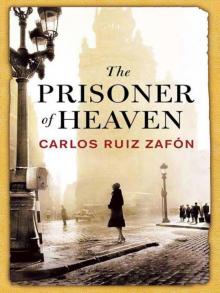 The Prisoner of Heaven
The Prisoner of Heaven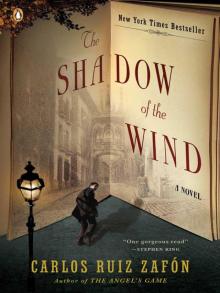 The Shadow of the Wind
The Shadow of the Wind Marina
Marina The Angel's Game
The Angel's Game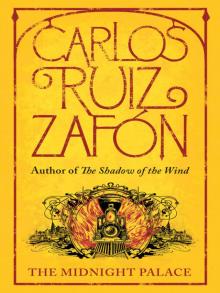 The Midnight Palace
The Midnight Palace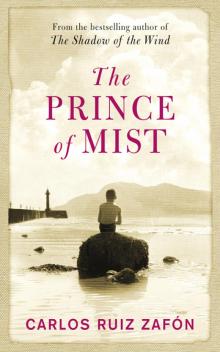 The Prince of Mist
The Prince of Mist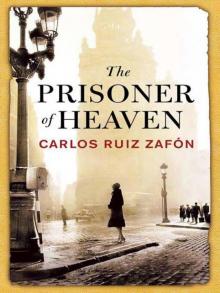 The Prisoner of Heaven: A Novel
The Prisoner of Heaven: A Novel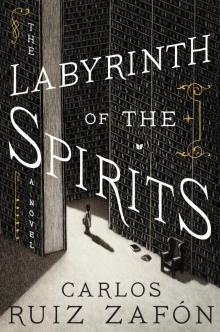 The Labyrinth of the Spirits
The Labyrinth of the Spirits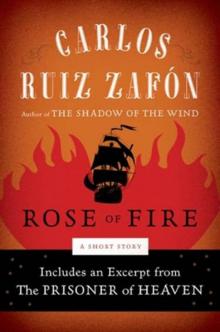 Rose of Fire
Rose of Fire